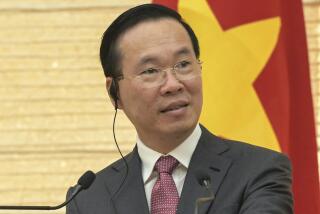SOUTHEAST ASIA : New Blood, Same Policy Likely at Vietnamese Party Congress
- Share via
HANOI — When the last congress of the Communist Party was held in 1986, Vietnam was on the verge of collapse. In desperation, the congress plunged into a series of sweeping economic reforms that make the Soviet Union’s campaign of renovation seem tame by comparison.
Now it is Vietnam’s turn to steer a conservative course. As the party faithful prepare to hold the seventh congress of the party late next month, the collapse of socialism in Eastern Europe and the increasing turmoil in the Soviet Union weigh heavily on Vietnam’s aging leadership.
“Hostile forces are stirring up waves of criticism against socialism, countering Marxism-Leninism and violating the interests of many nations,” Nguyen Van Linh, the party general secretary, cautioned recently. “We must be constantly on the alert, ready to frustrate all their insidious schemes and tricks, to defend socialism and to safeguard the revolutionary gains.”
As a result of such thinking, party officials and Western diplomats believe the seventh congress will venture into few, if any, policy initiatives, seeking to preserve the party status quo while pressing ahead with limited economic reform. The news at the congress is expected to be a major reshuffling of personnel designed to infuse some younger blood into the doddering Communist bureaucracy.
“It will be the same face with a new body,” quipped an East European diplomat.
One party member said it is expected that two-thirds of the ruling 12-member Politburo and perhaps half the governing Central Committee could be replaced by younger officials.
The positions of such key leaders as Linh, Premier Do Muoi and Foreign Minister Nguyen Co Thach seem secure, the official said, unless they decide to retire because of infirmity. Linh, 76, has been described as “quite ill” in recent years, terminology usually believed to mean a stroke, but he has since recovered.
One major change seems preordained: the replacement of President Vo Chi Cong, a southern politician, by Gen. Vo Nguyen Giap, a deputy premier, hero of Dien Bien Phu and the 1968 Tet offensive against the United States. At 80, Giap is no young reformer, but one party official said it is felt that the military must be given a prominent job in the hierarchy.
In the prelude to the congress, Linh and his colleagues have made clear that Vietnam will not tolerate any talk of a multi-party system. As for the system itself, the draft political report to the congress decreed that “to advance towards socialism is the inevitable path of our country.”
While the moves adopted in 1986 to liberalize the economy have won virtually unanimous support, the slow pace of political reform is drawing increasing criticism.
The Communist Review, a forum not noted for its reformist tendencies, recently published a scathing analysis by six well-known intellectuals of the party’s mistakes. “The reason for our existing shortcomings stems from our dogmatic application of socialism over the past 15 years,” said one government economist, Hong Ha. “If someone carries out the original doctrine of Marxism-Leninism, they will fail.”
Perhaps the greatest blow of all, however, was the criticism launched from Paris by Bui Tin, a deputy editor of the party newspaper and a disciple of Ho Chi Minh, founder of modern Vietnam. Tin urged the leadership to abandon its “great utopian illusions” and permit a multi-party system. While officially inviting criticism, the party has moved quickly to stifle such dissent. Tin was fired by his paper.
More to Read
Sign up for Essential California
The most important California stories and recommendations in your inbox every morning.
You may occasionally receive promotional content from the Los Angeles Times.










